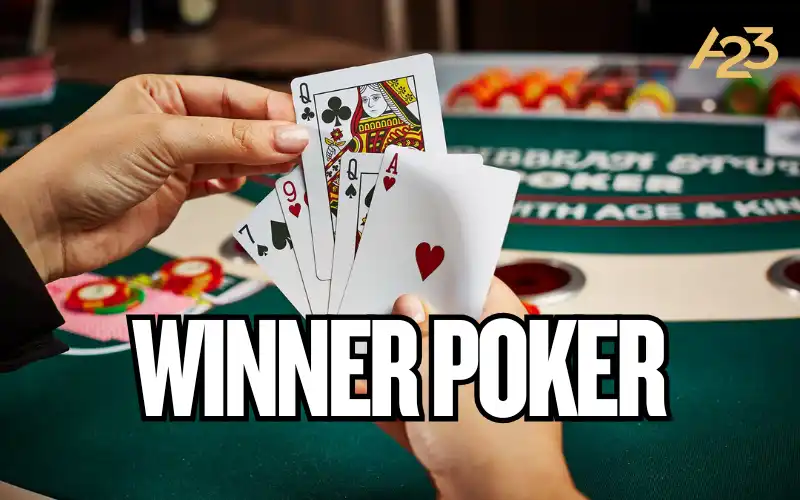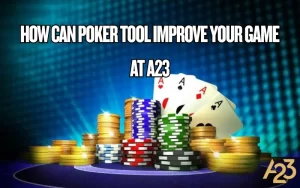Poker is a game of skill, strategy, and psychology, and mastering it can lead to significant rewards. A23 is a popular online poker platform that offers a variety of games and tournaments for players of all skill levels. Whether you are a novice looking to learn the ropes or an experienced player aiming to refine your strategies, understanding the fundamentals of poker and implementing effective strategies is crucial for success. In this article, we will explore essential poker strategies that can help you become a winner at A23.
1. Understand the Basics of Poker
Overview
Before diving into advanced strategies, it’s essential to have a solid understanding of the basic rules and mechanics of poker. Familiarize yourself with the different poker variants available at A23, such as Texas Hold’em, Omaha, and Seven-Card Stud.
Key Concepts to Learn
- Hand Rankings: Understand the hierarchy of poker hands, from high card to royal flush. Knowing which hands beat others is fundamental to making informed decisions during gameplay.
- Blinds and Antes: Learn how blinds and antes work, as they are crucial to the betting structure in most poker games. This knowledge will help you understand when to be aggressive and when to fold.
- Position: Your position at the table significantly impacts your strategy. Being in a later position allows you to see how other players act before making your decision, giving you a strategic advantage.
2. Develop a Solid Starting Hand Strategy
Overview
One of the most critical aspects of poker strategy is knowing which hands to play and which to fold. A solid starting hand strategy can set the foundation for your success at A23.
Tips for Starting Hand Selection
- Play Tight and Aggressive: Focus on playing fewer hands but playing them aggressively. This means raising or re-raising with strong hands rather than just calling. This approach puts pressure on your opponents and can lead to more significant pots.
- Know Your Position: Adjust your starting hand requirements based on your position at the table. In early position, play tighter and only enter the pot with premium hands. In later positions, you can widen your range and play more speculative hands.
- Consider Table Dynamics: Pay attention to the playing styles of your opponents. If you’re at a table full of aggressive players, you may want to tighten your starting hand range. Conversely, if the table is passive, you can afford to be more aggressive.
3. Master the Art of Bluffing
Overview
Bluffing is an essential skill in poker that can help you win pots even when you don’t have the best hand. However, successful bluffing requires careful consideration and timing.
Tips for Effective Bluffing
- Choose the Right Moments: Bluff when the board texture is favorable for a strong hand. For example, if the community cards are coordinated (e.g., two hearts and a straight draw), you can represent a strong hand more convincingly.
- Know Your Opponents: Understanding your opponents’ tendencies is crucial for successful bluffing. If you’re playing against tight players who only bet with strong hands, your bluffs are more likely to succeed.
- Maintain a Consistent Story: When you bluff, ensure that your betting pattern tells a consistent story. If you suddenly make a large bet after playing passively, your opponents may become suspicious.
4. Pay Attention to Betting Patterns
Overview
Observing your opponents’ betting patterns can provide valuable insights into their hand strength and help you make informed decisions.
Tips for Analyzing Betting Patterns
- Identify Player Types: Categorize your opponents as tight-aggressive, loose-aggressive, tight-passive, or loose-passive. Understanding their playing styles will help you predict their actions and adjust your strategy accordingly.
- Watch for Tells: While online poker lacks physical tells, players often exhibit behavioral patterns. For example, if a player suddenly becomes more aggressive after a series of passive plays, they may have a strong hand.
- Adjust Your Strategy: Use the information you gather from betting patterns to adjust your strategy. If you notice a player consistently betting large with weak hands, you can exploit this by calling with a wider range of hands.
5. Master Pot Odds and Expected Value
Overview
Understanding pot odds and expected value (EV) is crucial for making mathematically sound decisions in poker. These concepts help you determine whether a call is profitable in the long run.

Tips for Calculating Pot Odds
- Calculate Pot Odds: Pot odds are the ratio of the current size of the pot to the size of the bet you need to call. For example, if the pot is 50, the pot odds are 2:1. This means you need to win at least one out of three times to break even.
- Compare to Hand Odds: Compare your pot odds to the odds of completing your drawing hand. If the pot odds are greater than the odds of hitting your hand, it’s a profitable call.
- Consider Implied Odds: Implied odds take into account the potential future bets you can win if you hit your hand. If you believe your opponent will bet more on the next street if you hit your draw, this can influence your decision.
6. Manage Your Bankroll Wisely
Overview
Effective bankroll management is essential for long-term success in poker. It ensures that you can withstand the inevitable ups and downs of the game.
Tips for Bankroll Management
- Set a Budget: Determine how much money you can afford to lose and stick to that budget. This will help you avoid going broke and allow you to play responsibly.
- Choose the Right Stakes: Play at stakes that are appropriate for your bankroll. A common guideline is to have at least 20-30 buy-ins for the level you are playing. This provides a cushion for variance.
- Track Your Results: Keep a record of your wins and losses to analyze your performance over time. This will help you identify areas for improvement and adjust your strategy accordingly.
7. Continuously Improve Your Game
Overview
Poker is a game of constant learning and adaptation. To become a successful player at A23, you must continuously work on improving your skills and knowledge.
Tips for Continuous Improvement
- Study the Game: Invest time in studying poker strategy through books, videos, and online resources. Understanding advanced concepts will give you an edge over your opponents.
- Review Your Play: Analyze your sessions to identify mistakes and areas for improvement. Consider using software tools that allow you to review hand histories and analyze your decisions.
- Join a Poker Community: Engage with other players in online forums or local poker clubs. Discussing hands and strategies with others can provide valuable insights and help you learn from different perspectives.
Conclusion
Mastering poker strategies at A23 requires a combination of skill, discipline, and continuous learning. By understanding the basics, developing a solid starting hand strategy, mastering bluffing, paying attention to betting patterns, and managing your bankroll wisely, you can significantly improve your chances of success. Remember, poker is not just about the cards you hold; it’s about making informed decisions and adapting to the dynamics of the game. So, dive into the exciting world of poker at A23, apply these strategies, and embark on your journey to becoming a winning player!








